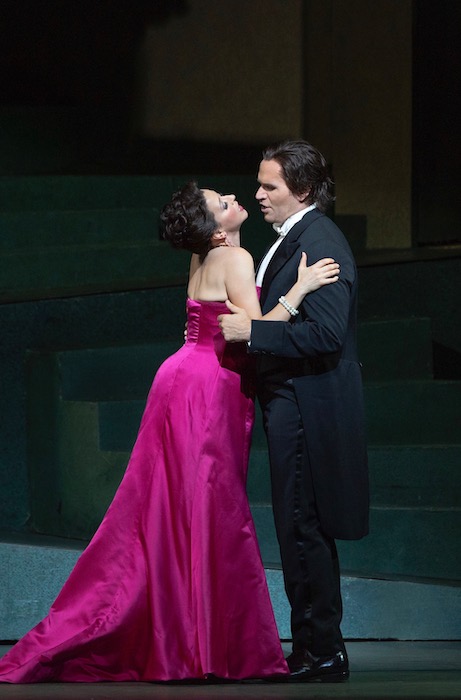Oropesa shines brightly in Met’s lethargic “Manon”

For the first time in several years, the Metropolitan Opera scored a major critical success to start the season, with its well-received opening of Porgy and Bess on Monday night.
Alas, the company failed to sustain that early-season energy, following up the opener with a lethargic revival of Massenet’s Manon on Tuesday.
The last time the company revived Laurent Pelly’s production in 2015, searing performances from the cast made for vivid readings of the opera’s rich, human characters, and helped compensate for the emotional detachment of the staging. This time around, sleepy acting and a general lack of energy both onstage and in the pit left the production bare, its sets looking alarmingly like recycled cardboard.
This was in no way the fault of the lead soprano, as Lisette Oropesa gave a performance as Manon that confirmed she is fully ready for leading roles at the Met. Her voice has grown in size and color since the days when she primarily appeared in soubrette parts: she has developed into a formidable lyric soprano, her voice filling out into a luscious instrument without losing any of its flexibility or tartness.
Moreover, Oropesa proved to be the rare soprano who can be entirely convincing in both sides of a complex role. In the first two acts she approached the role with a lovely, bright innocence, charming with a rendition of “Je suis encore tout étourdie” that combined spacious phrasing and breathless excitement, then channeling quiet but intense sadness in “Adieu, notre petite table.”
But the real highlight of her performance came after her transformation into fast-living libertine, with the Act III gavotte, “Obéissons quand leur voix appelle.” Here, Oropesa’s effortless vocal fireworks, rippling coloratura, blooming high notes, and subtly sultry phrasing made her character irresistible. She leaned into Manon’s sensual side, teasing out the allure of the deceptively coy melody, and bringing rich detail to both her physical and her vocal performance.
As Des Grieux, Michael Fabiano gave a fine vocal performance with a powerful, caramel-colored tenor so robust it sounded almost like a baritone. He blared with brilliant passion in the part’s more energetic moments, and showed a gentle warmth and impressive mixed-voice piano in the sublime Act II aria “En fermant les yeux.” His dramatic portrayal was less convincing: this Des Grieux seemed hardly interested in Manon, so absorbed was he in his own grand demonstrations of feeling—one of which nearly toppled one of the columns of St. Sulpice.
Among the supporting cast, Artur Ruciński was the clear standout for his endearing, polished performance as Lescaut. By turns affectionate, blustering, and bumbling, his winning portrayal of Manon’s doting cousin was matched by a rich, chestnut baritone and warm tone. Ruciński has made the most of his appearances as Sharpless and Marcello so far, but he ought to be getting more substantial opportunities.
Sadly, the rest of the supporting cast struggled to supply the energy that was missing from the opera’s central romance. The pot-bellied lech Guillot needs to be the engine of the work’s comic relief, yet Carlo Bosi had neither the timing nor the sly ease with the language to give much life to the humor.
Kwangchul Youn brought his distinctive cavernous bass to the Comte Des Grieux, yet lacked the presence to make him an imposing figure. Brett Polegato made a fine debut as De Brétigny, with a clear baritone, and Jacqueline Echols, Laura Krumm, and Maya Lahyani sparkled as the comic trio of Poussette, Javotte, and Rosette.
Sleepy acting and canned gestures onstage certainly accounted for much of Tuesday’s lethargy, but Maurizio Benini’s conducting was at least as much to blame. A house regular for bel canto revivals, he showed little feel for the more shapely contours of Massenet’s style. Ensemble scenes felt ragged and the pacing dragged throughout the night; more to the point, his rendition of the score was colorless, offering the singers little more than cues.
Manon runs through October 26 at the Metropolitan Opera. metopera.org



Posted Sep 25, 2019 at 2:31 pm by Alex
I disagree with the critique of Maestro Benini. He conducted the orchestra very well, and, together with Lisette Oropesa and Artur Rucinski, deserve most of the praise. I also admired Carlo Bossi’s French, and thought he sang his role quite well, his character is not about comic relief, as Act 4 clearly shows.
By far the weakest link, and really a very poor casting choice that truly breaks this run of Manon is Michael Fabiano. As noted in the above review, his acting skills were atrocious. His vocal color, capacity and range is not well suited to the role either. Not for a second there was any indication that he emotionally believed even a drop of what he was trying to sing. Then there is his behaviour on stage that went beyond acting: abruptly and awkwardly grabbing Ms. Oropesa, not looking at her, pushing *hard* Mr. Rucinski on stage in Act V… etc…
The last comment is for a rather anemic chorus, which did not show enough energy vocally or in motion, especially in acts 1 and 2. No doubt Placido Domingo’s resignation from the opera company weighed in on the performers last night, and also contributed to the somber mood.
Posted Sep 25, 2019 at 8:28 pm by Deborah Todd
Oh Dear. I hope they will take your comments and restructure the performance before I attend on Oct 26.
Posted Sep 26, 2019 at 9:07 am by Mortimer
I did not feel lethargic at all and thoroughly enjoyed the performance. I do agree that it was not very French, but so what, as long as it was well done? IMHO, it was (or will be known as) one of the season’s highlights.